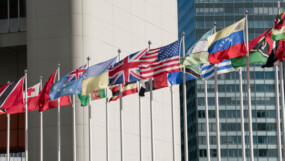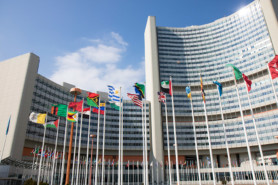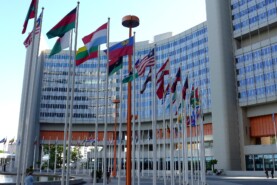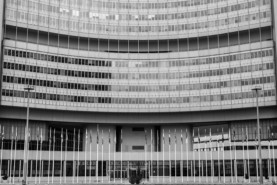Posted on 09 Jun 2025
The UN Commission on Crime Prevention and Criminal Justice (CCPCJ) held its 34th session in Vienna from 19 to 23 May. This followed the tumultuous March session of the Commission on Narcotic Drugs (CND), where the current political shifts in the US were on full display. Despite the financial and political crises being experienced by the UN Office on Drugs and Crime (UNODC) and its policymaking bodies, all the CCPCJ resolutions were adopted by consensus, in stark contrast to how the CND played out.
However, the UNODC’s current challenges were still evident beneath the surface, with polarized positions on issues such as sustainable development and gender. This was set against the backdrop of the UN’s funding crisis, including the significant impact of US funding decisions and upcoming UN reforms. Adding to this uncertainty, the UNODC’s executive director, Ghada Waly, resigned unexpectedly one week after the CCPCJ concluded, before the end of her current contract (due to expire in February 2026 with the possibility of renewal).
Nevertheless, the CCPCJ successfully passed several resolutions, demonstrating an ongoing commitment to finding multilateral solutions to crime and justice issues, and addressing the need for more effective responses to transnational organized crime.
Successful negotiations
The US tabled a resolution on the implementation of the Protocol on Smuggling of Migrants of the UN Convention Against Transnational Organized Crime (UNTOC), co-sponsored by a number of states, including Morocco, Canada, Japan, Italy, Israel, Zimbabwe, the UK and Hungary. The resolution aimed to enhance the application and impact of the protocol, and clearly sought to avoid more contentious migration policy issues.
Although it was adopted by consensus, disagreements emerged during the negotiations. Iran – one of the few countries that have not signed up to the UNTOC – objected to the resolution’s implication that the protocol is the ‘primary international legal instrument’ for combatting migrant smuggling. Another contentious issue was the resolution’s original intent to ‘call upon Member States to prioritize the fight against the smuggling of migrants’, as it was noted that this formulation assumes that some states prioritize this issue while others do not. The delegations finally agreed on the following wording: ‘[The CCPCJ] calls upon all Member States to promote and strengthen measures to fight against the smuggling of migrants’.
Colombia presented a resolution on countering the smuggling of commercial goods, co-sponsored by the UK, Brazil, South Korea, Albania, Chile, Canada, Japan, Peru, Vietnam, Ecuador, Ghana, Honduras and the EU. The resolution acknowledges that the smuggling of commercial goods is a form of transnational organized crime that poses serious threats to economic stability, public health and security. It calls for increased collaboration and partnerships to improve the implementation of the UNTOC to address this crime.
While it highlights the need for more effective UNTOC implementation, Colombia faced some difficulties in adopting the resolution. Some states argued that the resolution should be implemented through technical assistance only, without a reference to ‘capacity building’, which the US opposed on the grounds that capacity building is a broader concept than what is strictly necessary to help a state implement the convention’s provisions. As with most resolutions at this year’s CCPCJ, this text also included updated language on the UNODC’s use of resources, also prompted by the US in the context of the organization’s funding crisis, largely brought on by the US suspending and ending many foreign assistance programmes. (Previously, approximately 40 per cent of the UNODC’s budget was provided by US foreign assistance.) A paragraph was included requesting that the UNODC ‘utilize any … extrabudgetary resources efficiently and effectively’.
A resolution on advancing crime prevention at all levels was tabled by Finland and co-sponsored by Albania, Colombia, the EU, Iceland, Moldova and Norway. This emphasizes the importance of comprehensive crime prevention strategies that address the root causes of crime and recognizes the need for cross-sectoral approaches to addressing crime prevention.
Several points of contention arose during the negotiations. The resolution’s original title was ‘Advancing the global crime prevention agenda’, but the Iranian and US delegations objected, arguing that this would shift the focus away from domestic responsibilities. The delegations finally agreed on a more generic title. The US delegation also requested the removal of references to sustainable development, which were replaced with references to the rule of law. Additionally, several countries (including the US, Argentina and Iran) succeeded in watering down or generalizing references to gender throughout the resolution.
Lastly, Brazil proposed a resolution on crimes that affect the environment, supported by the UK, Japan, Colombia, Ecuador, Peru, Uganda and Ghana. The resolution highlights a number of multilateral processes related to environmental crime and calls for greater action through these channels – including through a new intergovernmental expert group to analyze existing responses and consider a new protocol to the UNTOC. This expert group was set up in 2024 by the UNTOC’s Conference of the Parties through resolution 12/4.
As with the difficult adoption of resolution 12/4 in 2024, this was the most contentious text debated during the session. The wording was consistently softened, with delegates replacing imperatives such as ‘urges’ with ‘encourages’ or ‘recalls’ in order to reach a consensus. A major point of disagreement concerned the entity to which the resolution should be addressed. Brazil advocated addressing it to the UN General Assembly to elevate political attention, while Venezuela and others (including Germany, which is leading a similar resolution on illegal wildlife trafficking through the General Assembly) preferred keeping it within the CCPCJ to avoid undermining ongoing expert negotiations and Vienna-based processes, such as the intergovernmental expert group. The resolution was ultimately addressed to the General Assembly, paving the way for future discussions in New York.
Another critical issue was a paragraph acknowledging the rights of Indigenous peoples, to which the US delegation objected on the grounds that it merged concepts beyond the scope of the UN Declaration on the Rights of Indigenous Peoples, so a shorter text referring to the declaration was adopted. Another notable disagreement concerned stakeholder collaboration. The US suggested removing specific references to NGOs, academia, the media and scientific communities, but many countries – including Canada and Germany – strongly supported their inclusion. In the end, a more general reference to ‘stakeholders’ was included.
Who will be driving on the road to Abu Dhabi?
A resolution paving the way for the 15th UN Crime Congress, which will take place in Abu Dhabi in April 2026, was tabled by the chair of the CCPCJ (the Mexican ambassador in Vienna), Japan and the UAE, and co-sponsored by the Philippines, Russia and Vietnam. The congress will take place at a time of great uncertainty, and the hosts will be hoping for a smooth conference.
While they may be encouraged by the relative consensus at the CCPCJ, the Crime Congress is a different affair. Although it is not a policymaking body, it is responsible for facilitating engagement among different sectors – such as civil society and academia with governments and the UN – in order to set the UN’s strategic direction on crime and justice issues. This is urgently needed in the context of rampant and expanding transnational organized crime, a crisis in multilateralism and financing (which directly impacts the UNODC’s ability to fulfil its functions) and an absence of institutional leadership.
It is as yet unclear who will be at the helm of the UNODC in Abu Dhabi, but whoever takes up this role will face the daunting task ahead of steering the international community towards a more effective approach to tackling transnational organized crime in an ever-changing and increasingly polarized world.



